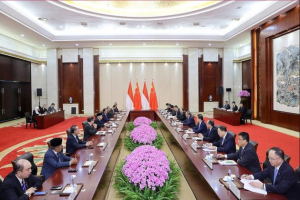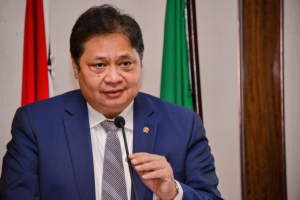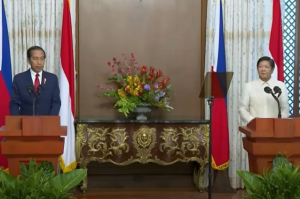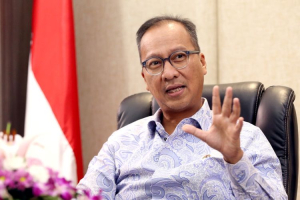Indonesia can no longer be pacifist on the South China Sea issue
By Nikolaus Loy, a lecturer on international relations at the UPN Veteran University. Yogyakarta
The third presidential debate on January 7, 2024, which discussed issues of defense, security, geopolitics and international relations, was unsatisfactory because the three candidates, in my view, failed to provide satisfying answers when they were asked about their opinion on how to deal with the South China Sea issue.
Prabowo Subianto put the emphasis on conventional defense forces, while Anies Baswedan promoted the ASEAN centrality, and Ganjar Pranowo sugested the provision of oil tankers for naval logistics.
South China Sea is a complex issue as it involves overlapping claims by several ASEAN countries − Vietnam, the Philippines, Malaysia and Brunei − as well as Taiwan and China.
China claims the South China Sea as part of its territorial sovereignty, drawing a 'nine-dash line' that encompassed the entire South China Sea. One of the bases for China's claim is that the South China Sea is an 'adjacent water' on which to base a claim. However, such term is not recognized in the international maritime law.
The involvement of the United States adds to the complexity of the conflict in the South China Sea. One of the purposes in establishing a defense pact with Australia and the UK is to respond to China's actions in the South China Sea and to anticipate changes in the strategic balance in the Indo-Pacific region.
Indeed, US’s involvement is a necessity to counterbalance China. Without the US, there is no force capable of compelling the expansion of China's claims from the South China Sea region. The US’s presence was meant to ensure that the South China Sea will remain a peaceful shipping lane, open to ships of all countries.
Economically, the South China Sea is one of the arteries of the global economy. East Asian countries − Japan, South Korea and ASEAN − are the engines of global economic growth. Open conflict in this region will disrupt trade routes and energy supplies in Asia. The consequences could be devastating to global economic stability.
The South China Sea is believed to contain huge deposits of natural gas, oil and methane. China’s claim on the South China Sea is apparently due to the region’s high energy content.
The fast-spinning industrial machine and the increasingly powerful military muscle clearly need lubricants, namely oil and gas. China's domestic energy production is not enough and the oil and gas potential in the South China Sea could obviously meet the country's energy needs.
Fishing resources are another potential. There are billions of mouths to feed, not only in China but also in ASEAN. Controlling the South China Sea region means controlling an important source of protein to feed a growing population.
Indonesia needs to shift stance
Initially, Indonesia always tried to distance itself from the South China Sea conflict. The government's argument was that we are not a claimant state, which is not correct. Indonesia can no longer be a 'pacifist' in the South China Sea for two reasons.
First, an open conflict in the South China Sea will disrupt the security and economic stability of ASEAN, of which Indonesia is a key member. Although Indonesia is not a claimant state, it must directly get involved in efforts to prevent the conflict and resolve territorial disputes.
Second, China has included part of the North Natuna Sea in its nine-dash line. In 2021, China sent a diplomatic note to the Indonesian government, essentially asking Indonesia to stop oil and gas drilling activities in Indonesia’s own Exclusive Economic Zone (EEZ) in the North Natuna Sea. China claims that the drilling site is within its territorial waters. Chinese coastguard vessels have also entered Indonesia's exclusive economic zone in Natuna waters on several occasions.
A memorandum of protest could demand a change to a more assertive political and security response in the South China Sea. Being silent and distancing itself from the South China Sea conflict is no longer relevant for Indonesia. It is only a matter of time before China's claims will extend to Natuna.
China's pattern of control over the water should be a lesson to Indonesia. "Crossing the river by feeling the stones" is China's strategy in formulating various policies. The phrase was first coined in 1950 by Chen Yun, a leading figure in the Chinese Communist Party. The point is to do things gradually. Like people crossing a river, first feel the ground. If it's strong, take the next step.
Deng Xiao Ping adopted the phrase in his economic reform campaign in the 1980s. He started by opening up three southern provinces to foreign investment, followed by other regions and opening up other sectors of the economy as well.
In the case of the South China Sea, a similar gradual strategy is applied. China's claims are old. Its occupation of Mischief Reef, an atoll claimed by the Philippines, dates back to 1995. The lenient attitude of the US and claimant countries encourages China to continue to 'cross the river to build a foothold'. That river is the South China Sea.
On Mischief Reef, China is building a military base. Meanwhile, the US Naval War College reports that China is building a city in the Paracel islands, a cluster of islands in the South China Sea that is included in the disputed territory (https://www.cnbcindonesia.com).
The reaction of the US and UK by sending naval fleets to the South China Sea was actually too late. China's position is already much stronger and therefore dares to challenge the power of the US Navy. If the US had prevented China from building some coral islands in the first place, China's position would not be as strong as it is now.
The expansion of China's claims to Indonesia's maritime zone is not impossible after a strong foothold in the South China Sea. The capability of the People's Liberation Army Navy had not been able to match the US’s 7th Fleet. However, it is only a matter of time as the construction of China’s third aircraft carrier demonstrates the country's ambition to expand its sphere of influence and ability to control the Indian Ocean and LCS. Indonesia cannot keep its distance from conflicts in these important regions.
What can be done?
The new election-winning president must place the South China Sea issue as a priority agenda. Developments in this maritime region require a comprehensive and multi-tiered policy response. First, at the regional level, Indonesia needs to encourage a more active role for ASEAN. ASEAN's joint efforts in introducing the idea of the 'ASEAN Outlook of Indo-Pacific' (AOIP) could be strengthened.
In contrast to the Indo-Pacific idea that places China as an 'enemy' that must be contained, the AOIP presents the Indo-Pacific as an open area of cooperation.
Domestically, a combination of political and military approaches can be taken to anticipate the expansion of conflicts in the South China Sea in the future. President Joko Widodo has already started.
In the political sphere, for example, Indonesia gave the name 'North Natuna Sea' to the waters around Natuna. This is a 'language political game'.
The use of the name 'Natuna' strengthens Indonesia's territorial claim. 'Natuna' is different from 'China' in the name 'South China Sea'. "Natuna is outside of the LCS, so do not disturb Natuna.
In addition, defense and security in Natuna need to be strengthened. The steps to take should include increasing the capacity of Marine Security Agency (Bakamla) ships, increasing the frequency of maritime patrols, and adding the number of warships. The government's plan to build a naval base in Natuna is correct.
The Indonesian Navy has already surveyed the location of the base in 2022. The deployment of attack helicopters, Apaches, purchased from the US also enhances the Indonesian Military’s (TNI) response capability to violations of sovereignty and other security threats.
Another important strategy is to increase tangible presence. This is done by accelerating oil and gas exploration and exploitation contracts in Natuna.
If Pertamina is unable to perform the task, the presence of foreign oil and gas companies can strengthen Indonesia's real presence in the Natuna maritime zone.
Empowering local fishermen is another way of presenting the 'Republic of Indonesia' in the North Natuna Sea. Providing Riau Islands fishermen with fishing vessels and navigation equipments willl enable them to operate further into Indonesia’s EEZ.
The fishermen are not combatants, but they can be the 'eyes and ears' of the Indonesian Navy. Fishermen can report boundary violations, illegal fishing and other threats.
Indonesia’s experience of losing the Sipadan and Ligitan should be a lesson learnt. 'Real presence' was one of the reasons behind the International Court of Justice's decision to uphold Malaysia's claim to the two islands. Malaysia, he said, built tourist destinations and turtle sanctuaries on both islands.
Already have an account? Sign In
-
Start reading
Freemium
-
Monthly Subscription
20% OFF$29.75
$37.19/MonthCancel anytime
This offer is open to all new subscribers!
Subscribe now -
Yearly Subscription
33% OFF$228.13
$340.5/YearCancel anytime
This offer is open to all new subscribers!
Subscribe now







